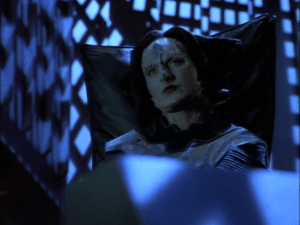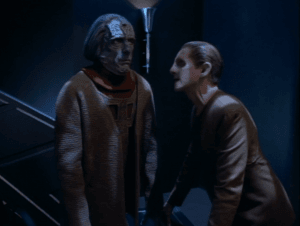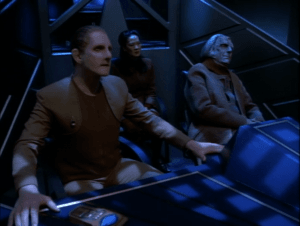
On the station, Dax’s analysis of the voiceprint reveals that it’s a fake, constructed syllable by syllable from a recording of O’Brien’s voice. Just then, Kira enters and announced that they have their Maquis suspect. Surprise! It’s Boone! Meanwhile, the trial is getting underway. It’s a rocky start, to say the least. Odo runs roughshod over what passes for courtroom procedure on Cardassia, becoming especially animated (to the point of asking to a change of venue, given that the alleged crime was committed by a Starfleet officer at a Bajoran station) when Kovat tells him that new evidence can’t be submitted after a verdict has been reached and Makbar similarly displays little interest in said evidence, which she dismisses as Federation chicanery. Back on DS9, Sisko and Kira question Boone, who isn’t exactly helpful. Sisko has him held for further questioning. That night, Bashir is greeted in a darkened infirmary by a man from the Maquis, who tells him they knew nothing about the theft and that Boone isn’t one of them.
As the trial continues, Gul Evek testifies, answering a series of softball questions from Kovat. Evek asserts that the Maquis arranged the theft of the warheads found on O’Brien’s runabout. He attributes this knowledge to “reliable sources,” and refuses to say more, conveniently citing national security (“the age-old cry of the oppressor”). Meanwhile, Bashir’s meeting with the Maquis has led them to look a little deeper into Boone’s past, and they’ve found that he left his wife, cut off contact with his parents, left Starfleet and generally seemed to have become a different person some eight years ago. Not long after the events on Setlik III. Confronted with all this, he tries to run, but to no avail.
In the courtroom, it’s time for O’Brien to take the stand. Of course, he’s not exactly given a fair hearing, as Kovat asks a string of provocative questions. When the conservator relents, Makbar brings up his war record, asking how many Cardassians O’Brien has killed and throwing his well-known mistrust of Cardassians in his face. Kovat concedes the verdict, leading to an outburst from O’Brien. Just as Makbar is about to bring the trial to a close, Sisko enters with Boone in tow. Neither says anything, but Makbar knows the jig is up and in an uncharacteristic move for a Cardassian court, shows leniency, reiterating O’Brien’s supposed guilt and sets aside the verdict, releasing him into Sisko’s custody.
On the runabout, Sisko and Odo put the pieces together for the O’Briens. The theft, the trial, none of it was really about framing O’Brien. Rather, it was an attempt to undermine the Federation by making it appear as though the Maquis had their official sanction. This would have given them grounds to press for the disbanding of the Federation’s border colonies and take actual military action in the DMZ. The episode ends as Sisko tells the O’Briens that they’ll be dropped off at their original destination to resume their vacation. Miles tried to protest, but given all the favors he had to call in to extend the couple’s reservations, Sisko isn’t having it.

Earlier, I talked about how “O’Brien must suffer” was basically the ‘Deep Space Nine’ writers’ cheat code for a good episode, and for my money, ‘Tribunal’ is one of the better examples of that trope. It’s something of a truism that ‘Next Generation’-era ‘Star Trek’ shows didn’t really get good until Season Three. ‘Deep Space Nine’ bucks that trend a bit. While it really starts to become the show we know and love in the third season, it very visibly starts to hit its stride in the last third of the second (once it digs itself out of a midseason slump). And this episode is a prime example of that. It’s a gripping hour of TV, but more than that, it does some really interesting world building and character work and even gets a bit meta in terms of its format.
Functionally, ‘Tribunal’ is a courtroom drama. And courtroom dramas often do make for good viewing. But the thing about courtroom dramas is that they tend to run roughshod over actual courtroom procedures and legal processes in the name of compelling drama. All sorts of shows and movies do this (just sit down to watch an episode of ‘House’ with an actual doctor and see what I mean), to the point that it’s just something you have to roll with to some extent in any piece of fiction. ‘Tribunal’, however, turns that to its advantage. In depicting an alien legal system designed around show trials, the episode frees itself from the need to display any particular fidelity to how any real world legal system actually works. More than that, though, is the fact that Cardassian trials are show trials in every sense of the word. It’s not just that the verdict is determined in advance (and the accused is always guilty), it’s also a spectacle. Even real world trials have a performative element (which you’ll be well aware of if you’ve ever served on a jury), after all, the Cardassians just take it to another level.
 We’re told as much in the episode; the real purpose of a Cardassian trial is not to establish guilt or innocence. Rather, it’s to coax a public confession out of the “guilty” party, providing the people with a sort of spectacle and catharsis, all while reinforcing the image of the state’s supposed infallibility. This is underscored by both Makbar and Kovat, who repeatedly remark on what makes good viewing or how the trial will make the audience feel. Thus, even the more egregious breaks procedural lapses, the sorts of things that on any other show would be done simply to increase the drama? Well, it’s the same here, only amping up the drama for the audience is – in this case – a primary function of this particular judicial system being depicted. Very meta.
We’re told as much in the episode; the real purpose of a Cardassian trial is not to establish guilt or innocence. Rather, it’s to coax a public confession out of the “guilty” party, providing the people with a sort of spectacle and catharsis, all while reinforcing the image of the state’s supposed infallibility. This is underscored by both Makbar and Kovat, who repeatedly remark on what makes good viewing or how the trial will make the audience feel. Thus, even the more egregious breaks procedural lapses, the sorts of things that on any other show would be done simply to increase the drama? Well, it’s the same here, only amping up the drama for the audience is – in this case – a primary function of this particular judicial system being depicted. Very meta.
All of that is fascinating in terms of what it says about Cardassian society, but that’s not all the episode has to offer. It is, after all, first and foremost about O’Brien having been kidnapped and subjected to this sham of a trial. Even by this point, Cardassian totalitarianism was well established, but the revelations in this episode really ups the Orwell factor. But it’s not just a Cardassian episode. It’s an O’Brien episode (though I also have to sneak in a mention of just how badass Odo is in the trial scenes).
 There’s a dark irony, given the character’s backstory, that O’Brien would be the one subjected to a Cardassian show trial. His animosity toward the Cardassians dates back to the very episode that introduced the species, the fourth season ‘Next Generation’ episode ‘The Wounded’. In addition to setting up the horrors he confronted during the Border Wars, it also establishes O’Brien as one of only a handful of ‘Star Trek’ characters to display any sort of bigotry. And that’s something that comes back to bite him in a big, big way in this episode. Major Kira – herself no stranger to hating Cardassians – points it out when the evidence seems to point toward O’Brien having some involvement with the Maquis. And given his past, it certainly wouldn’t be surprising. In fact, it’s almost certainly what painted a target on his back when the Cardassians were planning this fiasco. And it’s ultimately thrown in his face by Makbar during the trial. Innocent he may be, but by his own admission, he’s no angel. And it’s that sort of depth and complexity of character – and the show’s willingness to throw its heroes into a pit full of their deepest fears – that makes ‘Deep Space Nine’ such a standout entry in the franchise. There’s a reason this show is the metric against which ‘Discovery’ often seems to measure itself. Not bad for a ‘Trek’ that was so often overlooked in its day.
There’s a dark irony, given the character’s backstory, that O’Brien would be the one subjected to a Cardassian show trial. His animosity toward the Cardassians dates back to the very episode that introduced the species, the fourth season ‘Next Generation’ episode ‘The Wounded’. In addition to setting up the horrors he confronted during the Border Wars, it also establishes O’Brien as one of only a handful of ‘Star Trek’ characters to display any sort of bigotry. And that’s something that comes back to bite him in a big, big way in this episode. Major Kira – herself no stranger to hating Cardassians – points it out when the evidence seems to point toward O’Brien having some involvement with the Maquis. And given his past, it certainly wouldn’t be surprising. In fact, it’s almost certainly what painted a target on his back when the Cardassians were planning this fiasco. And it’s ultimately thrown in his face by Makbar during the trial. Innocent he may be, but by his own admission, he’s no angel. And it’s that sort of depth and complexity of character – and the show’s willingness to throw its heroes into a pit full of their deepest fears – that makes ‘Deep Space Nine’ such a standout entry in the franchise. There’s a reason this show is the metric against which ‘Discovery’ often seems to measure itself. Not bad for a ‘Trek’ that was so often overlooked in its day.
But what did you think of ‘Tribunal’? Let me know in the comments, and as always, make sure to check back in two weeks for the next ‘Final Frontier Friday’!
